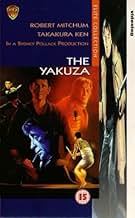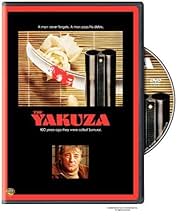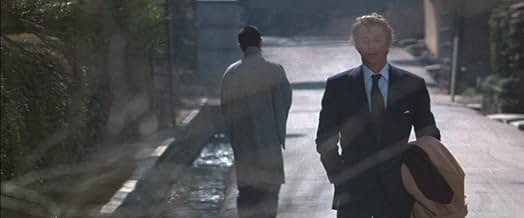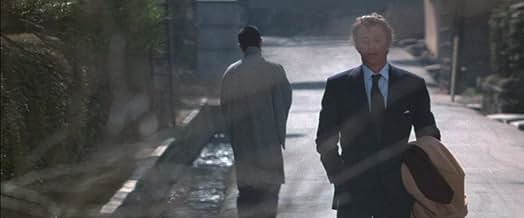IMDb-BEWERTUNG
7,2/10
11.216
IHRE BEWERTUNG
Der amerikanische Privatdetektiv Harry Kilmer kehrt nach Japan zurück, um die entführte Tochter eines Freundes aus den Fängen der Yakuza zu befreien.Der amerikanische Privatdetektiv Harry Kilmer kehrt nach Japan zurück, um die entführte Tochter eines Freundes aus den Fängen der Yakuza zu befreien.Der amerikanische Privatdetektiv Harry Kilmer kehrt nach Japan zurück, um die entführte Tochter eines Freundes aus den Fängen der Yakuza zu befreien.
- Regie
- Drehbuch
- Hauptbesetzung
Ken Takakura
- Ken Tanaka
- (as Takakura Ken)
Eiji Okada
- Toshiro Tono
- (as Okada Eiji)
Keiko Kishi
- Eiko Tanaka
- (as Kishi Keiko)
Kyôsuke Machida
- Jiro Kato
- (as Kyosuke Machida)
Eiji Gô
- Shiro 'Spider' Tanaka
- (as Go Eiji)
Empfohlene Bewertungen
One of the best West-meets-East films made. Great dialogues, very realistic fighting scenes, even though this film has been made so long ago, without any CGI tricks at all, yet the sword fights still look really great. But in my opinion the story, which may be shortly described with one of the sentences spoken by Harry Kilmer (Robert Mitchum) at the end of this film: "I have destroyed his past, and his future" - perhaps the story is what it makes this film so unique and timeless. Outstanding performance by Ken Takakura ("Ken Tanaka")! If you haven't seen it yet - get it now! And why do I say "get it" instead of "rent it"? Because unfortunately VHS version available in US is more than 10 minutes shorter, and European VHS versions have even more *vital to the plot* cuts! (More info here: http://www.us.imdb.com/title/tt0073918/alternateversions
or if it doesn't work try the link under "Alternate versions"). Please: don't waste your time on those! I swear these edited versions must have been edited either by some blind and deaf personae, or a child who didn't understood plot at all! Currently the only good, somewhat true to the original theatrical print (just slightly more than 3 minutes shorter), are the 2hr long versions available on the not-so-legal (and not too good quality-wise) VCDs released in Hong Kong and Asia.
I rated this film very high - and I am not any big sword-actioneers fan, but nor is this movie any kind of sword fighting flicks. Its just a great story that is told (or actually shown) very well, and it deserves full 10/10.
or if it doesn't work try the link under "Alternate versions"). Please: don't waste your time on those! I swear these edited versions must have been edited either by some blind and deaf personae, or a child who didn't understood plot at all! Currently the only good, somewhat true to the original theatrical print (just slightly more than 3 minutes shorter), are the 2hr long versions available on the not-so-legal (and not too good quality-wise) VCDs released in Hong Kong and Asia.
I rated this film very high - and I am not any big sword-actioneers fan, but nor is this movie any kind of sword fighting flicks. Its just a great story that is told (or actually shown) very well, and it deserves full 10/10.
The strongest point of this film is the writing. It's the first Paul Schrader script ever to be filmed, written with his brother Leonard (who also worked with Paul on Blue Collar & Mishima) and Robert Towne (Chinatown, Marathon Man, Bonnie & Clyde). It seems we have the best of both Schrader's here; Leonard really understands the Japanese culture and Paul is a very cerebral and thematic writer who almost always raises a number of interesting issues.
The film, which is very respectful of it's foreign culture and tries to be as true as possible to it, first and foremost shows the differences between American and Japanese culture. However, there are so many themes in this movie though that it becomes tiresome to list them. The key ones include honor, loyalty, burden, duty, friendship, love, loss, obligation, and the differences between the men of pre and post war Japan.
Although Robert Mitchum was approaching 60 when made the film, he still possessed enough of his trademark grace to be credible enough against much younger men in the action scenes. He always exudes so much casualness and weariness, but his work here shows he was obviously fired up by the material.
The other standout actor is Ken Takakura. He plays an honorable man that everyone respects, but his honor and old ways also often make him intolerable to anyone around him. He hides the deep wounds of his character behind his stone face, but that doesn't in any way prevent him from conveys that he's a miserable man from another age who lives by his code but not for anything. As he's the native that used to be in the Yakuza and Mitchum is the gaijin that doesn't have to follow their honor system (although as the movie progresses, he subscribes to their codes and honor system more and more), Takakura gets to do all the skilled swordplay. His fighting won't thrill those who want a lot of stunts, but is great if you enjoy the psychology and strategy of the craft.
The film is it has a drab, low budget kind of look, mainly as a way to maintain the mood and tone of the piece. Some of the scenes really bring the material to life, particularly through some excellent camera work, but sometimes the look is indifferent and the soundtrack seems to be trying too hard. Aside from staying true to the material and getting strong performances, I wouldn't say that Sydney Pollack has done a great job here. This is not the kind of movie you watch if you are looking for John Woo action though, and for the most part the flaws are overshadowed by the strength of the script and performances. 8/10
The film, which is very respectful of it's foreign culture and tries to be as true as possible to it, first and foremost shows the differences between American and Japanese culture. However, there are so many themes in this movie though that it becomes tiresome to list them. The key ones include honor, loyalty, burden, duty, friendship, love, loss, obligation, and the differences between the men of pre and post war Japan.
Although Robert Mitchum was approaching 60 when made the film, he still possessed enough of his trademark grace to be credible enough against much younger men in the action scenes. He always exudes so much casualness and weariness, but his work here shows he was obviously fired up by the material.
The other standout actor is Ken Takakura. He plays an honorable man that everyone respects, but his honor and old ways also often make him intolerable to anyone around him. He hides the deep wounds of his character behind his stone face, but that doesn't in any way prevent him from conveys that he's a miserable man from another age who lives by his code but not for anything. As he's the native that used to be in the Yakuza and Mitchum is the gaijin that doesn't have to follow their honor system (although as the movie progresses, he subscribes to their codes and honor system more and more), Takakura gets to do all the skilled swordplay. His fighting won't thrill those who want a lot of stunts, but is great if you enjoy the psychology and strategy of the craft.
The film is it has a drab, low budget kind of look, mainly as a way to maintain the mood and tone of the piece. Some of the scenes really bring the material to life, particularly through some excellent camera work, but sometimes the look is indifferent and the soundtrack seems to be trying too hard. Aside from staying true to the material and getting strong performances, I wouldn't say that Sydney Pollack has done a great job here. This is not the kind of movie you watch if you are looking for John Woo action though, and for the most part the flaws are overshadowed by the strength of the script and performances. 8/10
Superb East-meets-West movie, I suspect largely due to Schrader's insight. Takakura Ken's performance really steals the show, though all actors are more than capable; Mitchum gives a great performance again. Not a martial arts movie, but contains a katana showdown that I can watch over and over again without finding fault [more believable than anything you'll see in 'Kill Bill'].
The story is gorgeously convoluted, keeping it's secrets to the very end, in a fitting Japanese manner. Action scenes are relatively restrained, and the story tells how Mitchum's character finally comes to understand Takakura Ken's character, and his apparently icy antagonism. When can we see a DVD copy?!
The story is gorgeously convoluted, keeping it's secrets to the very end, in a fitting Japanese manner. Action scenes are relatively restrained, and the story tells how Mitchum's character finally comes to understand Takakura Ken's character, and his apparently icy antagonism. When can we see a DVD copy?!
Not only is this a good 70's gangster/action flick, it is also one of the few movies about Japan ever produced in the States that does not make too many mistakes about Japanese culture.
Ken Takakura puts in a great performance which is no surprise since he first became famous in Japan for acting in yakuza (gangster) movies.
Anyone who has ever tried to understand or explain the concept of "giri" should see this movie!
Ken Takakura puts in a great performance which is no surprise since he first became famous in Japan for acting in yakuza (gangster) movies.
Anyone who has ever tried to understand or explain the concept of "giri" should see this movie!
I stumbled across this movie, back when I was in college, on late night television. At the time, I wasn't a Robert Mitchum fan. I always thought Mitchum had a way of sauntering through film roles, not always giving his best. The Yakuza, made when Mitchum was 58 years old, utilizes his style and persona to its maximum potential. He's world-weary, he's been through the mill and he's come out wiser, but not necessarily harder for it.
Written by Paul Schrader and Robert Towne, The Yakuza shows us a different side of the Gangster world than we have been privy to before. This is not a movie of good vs. bad; it's a movie about loyalty and honor to friends and family. We follow Mitchum as Harry Kilmer on a mission to save a friends daughter. For most movies made these days, that premise would be enough, but The Yakuza is deeply layered and far more interesting than that. It turns out that Harry had been in Japan after WWII and had fallen in love with a beautiful woman, Eiko. 30 years later Harry is back in Japan, much has changed, but his feelings haven't.
Harry teams up with Ken Tanaka, Eiko's brother, to find the kidnapped girl. Samurai swords slash and guns blaze, adding intense, well-choreographed action as the plot thickens and Harry realizes that this is no ordinary rescue. We learn a lot about the characters in the movie, from Harry and Eiko to Ken Tanaka and Harry's buddy George, but more than that we learn about Japan and its infamous and historic gangster world. This is a classic movie in every sense of the word and should be viewed as such. And if you're not a fan of Robert Mitchum before seeing this movie, you will be afterwards.
Written by Paul Schrader and Robert Towne, The Yakuza shows us a different side of the Gangster world than we have been privy to before. This is not a movie of good vs. bad; it's a movie about loyalty and honor to friends and family. We follow Mitchum as Harry Kilmer on a mission to save a friends daughter. For most movies made these days, that premise would be enough, but The Yakuza is deeply layered and far more interesting than that. It turns out that Harry had been in Japan after WWII and had fallen in love with a beautiful woman, Eiko. 30 years later Harry is back in Japan, much has changed, but his feelings haven't.
Harry teams up with Ken Tanaka, Eiko's brother, to find the kidnapped girl. Samurai swords slash and guns blaze, adding intense, well-choreographed action as the plot thickens and Harry realizes that this is no ordinary rescue. We learn a lot about the characters in the movie, from Harry and Eiko to Ken Tanaka and Harry's buddy George, but more than that we learn about Japan and its infamous and historic gangster world. This is a classic movie in every sense of the word and should be viewed as such. And if you're not a fan of Robert Mitchum before seeing this movie, you will be afterwards.
Wusstest du schon
- WissenswertesMartin Scorsese wanted to direct after Hexenkessel (1973), but the producers wanted Sydney Pollack. Scorsese is on record that he would very much have liked to direct the film and was disappointed that he was passed over. However, he got to direct Alice lebt hier nicht mehr (1974) instead after being sought out by Ellen Burstyn. "Alice" ended up making more than 20 times its budget and won Burstyn an academy award, while this film became a box office bomb.
- PatzerThe plane that Kilmer is boarding at the end is a Boeing 707; the one shown taking off in the last scene is a 727.
- Alternative VersionenFor the Spanish Castilian version all the dialogues were dubbed to Spanish, even the Japanese lines.
- VerbindungenFeatured in ...Promises to Keep (1974)
Top-Auswahl
Melde dich zum Bewerten an und greife auf die Watchlist für personalisierte Empfehlungen zu.
- How long is The Yakuza?Powered by Alexa
Details
Box Office
- Budget
- 5.000.000 $ (geschätzt)
- Laufzeit
- 1 Std. 52 Min.(112 min)
- Sound-Mix
- Seitenverhältnis
- 2.39 : 1
Zu dieser Seite beitragen
Bearbeitung vorschlagen oder fehlenden Inhalt hinzufügen


































